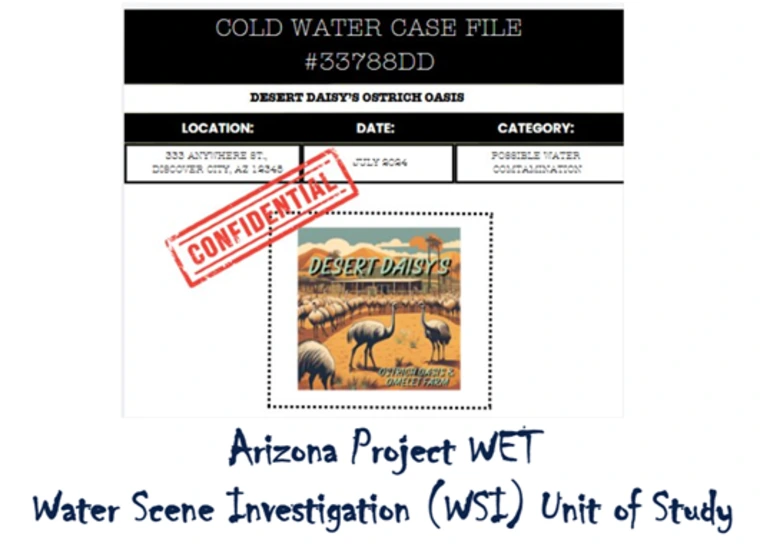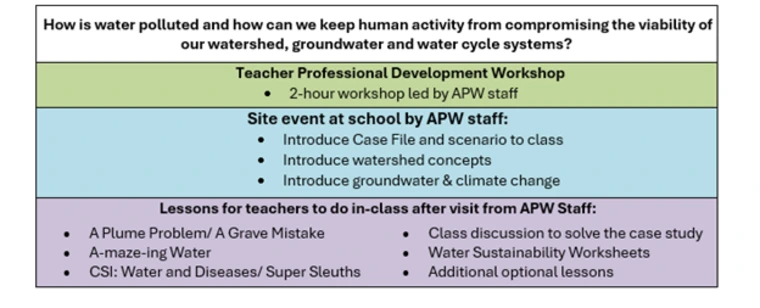
WSI Introduction:
You’re on the scene with WSI. In this campy but complex Unit of Study, juvenile detectives of the Cold-Water Case Squad investigate and identify the cause of a calamity in the community. Student sleuths work together, finding the clues that protect lives and livelihood; solving the question, “What’s in the WATER?” before time runs out!
The Unit of Study is designed to help teachers meet the 6th-8th grade science standards using student-centered, 3-dimensional learning. This focuses on doing science: asking questions and defining problems, developing and using models, planning and carrying out investigations, analyzing and interpreting data and constructing explanations and designing solutions. Emphasis also falls on recognizing relationships that connect all sciences and other fields of study. Specifically, the Arizona Water Scene Investigation (WSI) Curriculum Unit puts students at the center of their own water case, observing the phenomena that relate to the environment in which they live. Launching the unit, an interactive case file leads into the processes driving possible water contaminants and builds clear relationships between this and the water cycle, watershed, groundwater and the importance of sustainability.
Unit Guiding Questions:
How is water polluted and how can we keep human activity from compromising the viability of our watershed, groundwater and water cycle systems?
Four Fields of Study | Objectives:
WATER CYCLE – Detect the role of water in human/animal wellness and connect environmental health challenges to threats associated with a changing climate.
GROUNDWATER – Analyze data to solve a mystery and identify potential groundwater pollutants.
WATERSHED – Identify surface forms of pollution and consider ways to reduce urban runoff and the flow of contaminants in water throughout a watershed.
SUSTAINABILITY – Conclude that past solutions, developed with the best intentions, may create contemporary problems. Act as environmental stewards, conserving and keeping water clean through both behaviors and available technologies, supporting resilient solutions that benefit the (biodiverse) community.
Arizona Science & Other State Standards:
- MS-LS2-4 Construct an argument supported by empirical evidence that changes to physical or biological components of an ecosystem affect populations.
- MS-ESS3-2 Analyze and interpret data on natural hazards to forecast future catastrophic events and inform the development of technologies to mitigate their effects.
- 6.P2U1.4 Develop and use a model to predict how forces act on objects at a distance.
- 6.L2U3.11 Use evidence to construct an argument regarding the impact of human activities on the environment and how they positively and negatively affect the competition for energy and resources in ecosystems.
- 6.L2U3.12 Engage in argument from evidence to support a claim about the factors that cause species to change and how humans can impact those factors.
- 6.L2U1.13 Develop and use models to demonstrate the interdependence of organisms and their environment including biotic and abiotic factors.
- 7.E1U2.7 Analyze and interpret data to construct an explanation for how advances in technology have improved weather prediction.
- 7.P3U1.3 Plan and carry out an investigation that can support an evidence-based explanation of how objects on Earth are affected by gravitational force.
- 7.E1U1.5 Construct a model that shows the cycling of matter and flow of energy in the atmosphere, hydrosphere, and geosphere.
- 7.SL.1 Engage effectively in a range of collaborative discussions (one-on-one, in groups, and teacher-led) with diverse partners on grade 7 topics, texts, and issues, building on others' ideas and expressing their own clearly.
- 7.SL.1.d Acknowledge new information expressed by others and, when warranted, modify their own views.
- 8.E1U3.7 Obtain, evaluate, and communicate information about data and historical patterns to predict natural hazards and other geological events.
- 8.E1U3.8 Construct and support an argument about how human consumption of limited resources impacts the biosphere.
WSI Unit of Study At-A-Glance:

Unit-Wide Teaching Resources:
This guide contains all teaching instructions for each lesson.
WSI Curriculum Unit Guide, 2nd Edition Final - 2025-26
Also here is a link to a WSI 2025-26 Google Folder that has all documents and slides in it
The 3 lessons use slides to support the lesson objectives to give background and supporting information.
Google Slides:
PowerPoint:
PDFs:
Download this consolidated equipment and resource list showing required items per lesson. Alternately, you may view each lesson's list separately on the lessons page.
* If you are unable to download and of the documents, please contact an AWF Team Member and we will assist you.

